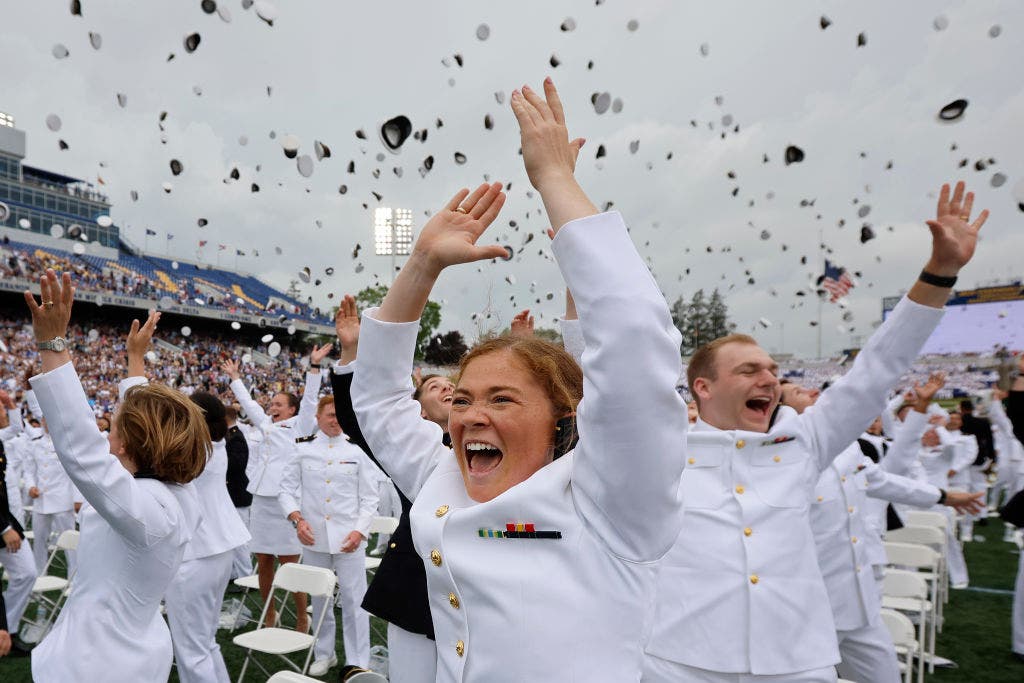The U.S. Naval Academy was founded in Annapolis, Maryland in 1845 following a scandalous mutiny aboard the U.S. Navy brig Somers, which resulted in the execution of three sailors, including the son of Secretary of War John Canfield Spencer. The incident highlighted the need for a rigorous training program for aspiring Naval officers, leading to the establishment of the school. The Naval Academy initially had a class of 50 midshipmen and seven professors, offering a curriculum that included mathematics, navigation, gunnery, and French. The school later became the Naval Academy, with a four-year course of study and summer training at sea.
The Naval Academy has produced a long list of distinguished graduates, including Fleet Admiral Chester W. Nimitz, President Jimmy Carter, and NASA astronaut Alan Shepard. The academy has also produced five chairs of the Joint Chiefs of Staff, nine Marine Corps Commandants, 54 astronauts, and 73 Medal of Honor recipients. The mutiny aboard the Somers, and the subsequent executions, played a significant role in shaping the history and reputation of the Naval Academy. The incident also highlighted the importance of discipline and training in preparing future Naval officers.
Captain Alexander Slidell Mackenzie, who ordered the executions on the Somers, faced criticism for his actions but was ultimately acquitted by court-martial. Despite the controversy surrounding the incident, the Naval Academy continued to educate and train generations of Naval officers, producing heroes, space explorers, and global leaders. The academy’s curriculum has evolved over the years to include a wide range of subjects, preparing graduates for careers in the Navy and beyond. The academy’s reputation for excellence in training and education has made it a prestigious institution with a rich history of producing leaders in the military and beyond.
The establishment of the U.S. Naval Academy was a direct result of the planned mutiny on the Atlantic Ocean, which shocked the nation and raised questions about the training and discipline of Naval officers. The incident aboard the Somers remains the only mutiny in the history of the U.S. Navy, highlighting the significance of the event in shaping the Navy’s history and the education of future officers. The execution of the mutineers underscored the importance of discipline and professionalism in the Navy, leading to a renewed focus on training and education at the academy.
The Naval Academy’s founding marked a turning point in the history of the U.S. Navy, leading to the creation of a dedicated institution for educating and training future Naval officers. The academy has since produced a long line of distinguished graduates who have served with honor and distinction in the Navy and beyond. The scandalous mutiny aboard the Somers served as a catalyst for the establishment of the academy, highlighting the need for a comprehensive training program for aspiring officers. The Naval Academy’s history is intertwined with the incident that led to its creation, shaping its mission and values for generations to come.
The U.S. Naval Academy continues to be a prestigious institution known for producing leaders in the military and beyond. The academy’s rigorous curriculum, training at sea, and emphasis on discipline have prepared generations of Naval officers for the challenges they will face in their careers. The legacy of the scandalous mutiny aboard the Somers lives on in the institution’s history, reminding future generations of the importance of integrity, discipline, and leadership in the Navy. The academy’s contributions to the nation’s defense and its tradition of excellence have made it a cornerstone of American military education and training.













